“Life Support”
Written by Christian Ford & Roger Soffer and Ronald D. Moore
Directed by Reza Badiyi
Season 3, Episode 13
Production episode 40512-459
Original air date: January 30, 1995
Stardate: 48498.4
Station log: Jake makes a date with a woman named Leanne, an old friend who had moved to Bajor. She recently a) returned to the station and b) broke up with her boyfriend, which makes Jake a very happy person.
A Bajoran transport has an accident en route to the station. Among the wounded on board are Winn and Bareil—the latter very badly injured. Bashir and Jabara work feverishly on the vedek, but the radiation damaged his neural pathways too severely and he dies on the table.
According to O’Brien there was a molecular fracture in a plasma conduit. Winn asks if it was sabotage, which surprises O’Brien, Kira, and Sisko, but she will only elaborate with the Emissary in private. She and Bareil were en route to a secret meeting with Legate Turrel of Cardassian Central Command. Bareil and Turrel have been talking for five months about a treaty between Bajor and Cardassia, and this was to be their first face-to-face meeting. Winn gives full credit to Bareil for starting the talks, and she fears that they won’t resume without him.
Bashir and Jabara start the autopsy, but then Bashir discovers that there’s still neural activity in Bareil’s brain. Bashir tries using a directed energy charge to get his brain going again—which works, as Bareil opens his eyes and starts breathing. Bashir thinks he should be able to make a full recovery in a few weeks.
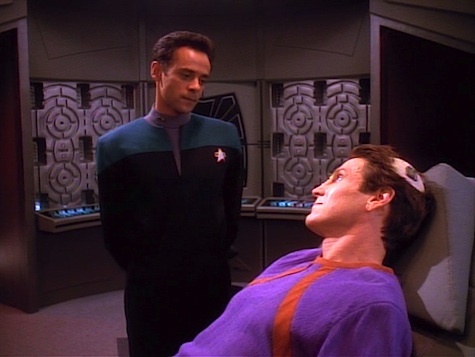
Winn does not wish to lose the momentum they’ve gained with Turrel, so she wants to invite the legate to the station to have the talks, with Bareil continuing to advise from his sickbed (which Bashir isn’t thrilled about, but agrees to).
Jake tells Nog that he can’t play dom-jot with him because of the date with Leanne, and Nog kind of forces himself into the date, leaving Jake to hope that Leanne has a friend.
Bashir’s revival of Bareil has had some side effects that is keeping his organs from receiving sufficient blood. Bashir wants to place him in stasis until he can figure out a solution, but Bareil refuses because he needs to be available to advise Winn. Bashir does have an alternative in an experimental drug that will increase the blood flow to his organs—but in 22% of the cases, there is severe organ damage, which could be fatal, particularly in his fragile condition. However, it will allow him to function normally during the negotiations, so he insists on those treatments even with the risks.
Turrel arrives, and Sisko sits in on the talks between him and Winn. They don’t go well, and Winn realizes that she needs Bareil’s help. He has a prior relationship with Turrel, and she really sucks as a diplomat.
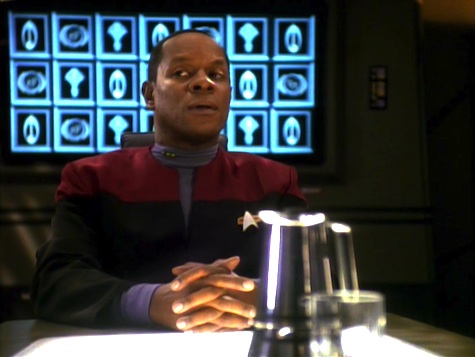
The double date goes incredibly badly due to Nog treating it like a Ferengi date, asking the females not to talk and to cut his food for him and so on. After the girls storm off, Nog and Jake are furious at each other, each thinking the other has ruined the date. They stop talking to each other, though Sisko convinces Jake to get Nog to talk it out. Jake gets Odo to arrest both him and Nog for a nonexistent crime and put them in a cell together, forcing Nog to talk to Jake. At first, the only thing he talks about is why they’re there: Rom threatened to send him home to Ferenginar if he stole again, and Jake is the station commander’s son. No way they’d be imprisoned without a lot of evidence, and Nog knows for a fact there isn’t any, because they didn’t do it—at which point Jake comes clean. He apologizes for forgetting that Nog is a Ferengi. (“To most people, the lobes are a dead giveaway!” Nog reminds him.) Nog admits that he actually was being considerate of Jake’s human sensibilities by not asking his date to chew her food first, only to cut it. They agree to never double date again.
Bareil discusses the negotiations with Winn, but it fatigues him greatly, to the point where Bashir and Kira threaten to call security on her if she doesn’t leave him alone. The drugs are damaging his organs quicker than expected. Bareil then makes the same demand of Bashir that Winn did before he kicked her out: do whatever it takes to get Bareil through the negotiations.
Bashir tries to talk Winn into freeing Bareil from his obligation to help her with the negotiations, which goes about as well as you’d expect (even after Bashir tries to play on her vanity). After that crashes and burns—inevitably, especially after Bashir abandons playing on her vanity and insults her instead—he leaves.
In mid-conversation with Winn, Bareil has a seizure—the drug has damaged his brain. He’ll never regain consciousness. Winn suggests positronic implants to replace the damaged brain tissue. Bashir points out that this is risky and may not work. Sisko thinks the primary concern should be what Bareil wants and both Kira and Winn agree that what Bareil wants is to see the negotiations with Turrel through to the end. Bashir—likely overwhelmed by Winn and Kira agreeing on anything—does it.
The Bareil who wakes up from the surgery is robotic, stiff, and cold. But he still recalls the negotiations with Turrel. His advice proves useful, and Winn and Turrel successfully complete the talks. A treaty is signed, causing shockwaves throughout the quadrant, but it’s a historic moment, the first step in putting the conflict between Bajor and Cardassia in the past.
There’s a celebration afterward, though Bashir isn’t in a mood to party, a mood that lessens when he’s summoned to the infirmary. The part of Bareil’s brain that remains is also failing, and if Bashir replaces it with an artificial one, he won’t be Bareil anymore. His brain activity will cease within the next three hours, and Kira sits with him for that entire time, saying a tearful goodbye.
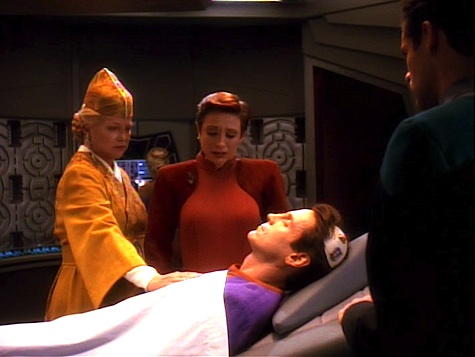
Can’t we just reverse the polarity? Bashir is able to use positronic implants to replace the parts of Bareil’s brain that are damaged by his injuries.
The Sisko is of Bajor: Sisko admits to Jake that he was wrong to tell him back in the first season that humans and Ferengi had too little in common, and he says that their friendship is the reason why he’s changed his mind. Having said that, Jake does realize that there are differences that they’ll have to deal with.
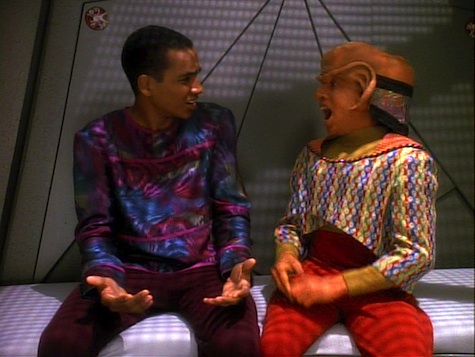
Don’t ask my opinion next time: Kira’s function in this episode is mostly to sit by while things happen to her boyfriend, but she does get a strong closing scene, as the episode ends with a slow pull-away from her telling Bareil how much he’s meant to her.
Rules of Acquisition: Nog has a personal rule that is not an official Rule of Acquisition: “Money is money, but women are better.” He strokes his ear on that last bit….
After the treaty is signed, Quark creates a chocolate souffle with Haligian tongue sauce called the Kai Winn. He says it’s selling phenomenally well.
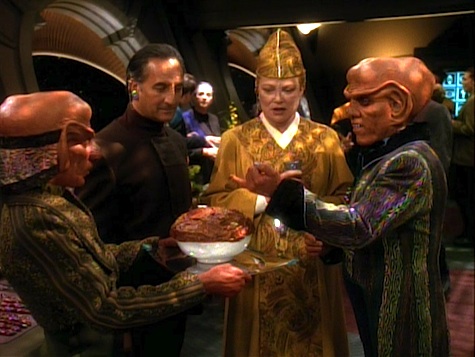
For Cardassia! Legate Turrel seems to be genuinely interested in peace—but he also doesn’t hesitate to try to take advantage of Bareil’s absence to try to get concessions from Winn that he’s already been denied by Bareil.
No sex, please, we’re Starfleet: Jake presumably first met Leanne at school, and she was probably one of the families that left the station for Bajor due to the Dominion threat after “The Search” two-parter. She was dating someone else then, and they all went to the Klingon restaurant where they learned that ordering gagh was a spectacularly bad idea. Jake’s initial thought for his date with Leanne is the Klingon restaurant again (without ordering gagh), but once it’s a double date, it’s moved to Quark’s.
What happens on the holosuite stays on the holosuite: Nog suggests he and Jake go to the holosuite called the Massacre of Ferris VI, where they will loot and pillage—while, presumably, their dates watch them all dewey-eyed and impressed.
Keep your ears open: “She’s so dumb. She’s perfect!”
Nog’s demonstration of Ferengi sexism.
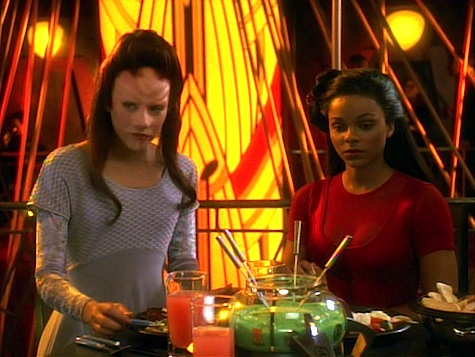
Welcome aboard: Philip Anglim makes his final appearance as Bareil (though he’ll be back as the much less spiritual Mirror Universe version of Bareil in “Resurrection”). Other recurring guests include Louise Fletcher as Winn, Aron Eisenberg as Nog, and Ann Gillespie as Jabara. Andrew Prine, last seen on TNG’s “Frame of Mind,” plays Turrel. And this week’s Robert Knepper moment is Lark Voorhies, best known as Lisa Tuttle in Saved By the Bell, appears as Leanne.
Trivial matters: The inspiration for the original story pitched by Christian Ford & Roger Soffer was Mary Shelley’s 1818 novel Frankenstein, or the Modern Prometheus, with the focus being on Bashir.
Bareil was established as being one of Winn’s aides in “Fascination.” Winn’s ongoing involvement in Bajoran politics will next be seen in “Shakaar.”
The peace treaty between the Bajorans and Cardassians will continue to be a factor in the series going forward.
One assumes that the positronic implants Bashir puts in Bareil derives at least in part from the technology used to create Data, who has a positronic brain. It was established in TNG’s “The Measure of a Man” and “Data’s Day” that there is ongoing research into positronic technology at the Daystrom Institute.
Louise Fletcher was sick with the flu during filming, and had to lie down between takes. It’s especially noticeable in the scene in the wardroom with Sisko after Turrel calls a recess: her voice is awfully scratchy….
Walk with the Prophets: “You just accepted your confusion better than anyone I’ve ever known.” Ah, the A and B plot—a boon to ensemble-cast dramas that either a) need to find something for more of the cast to do and/or b) don’t have enough story for an hour so add a second story. Ideally, the two are at least vaguely connected, but sometimes it doesn’t work out that way.
“Life Support” isn’t quite the worst mix of A and B plots in Trek history—it doesn’t even come close to, for example, TNG’s “Cost of Living,” in which the A and B plots didn’t even appear to be in the same time-space continuum—but it’s pretty egregious in that the tones of the two plots are almost contradictory. The A plot with Bareil and Winn is pretty heavy stuff, and the Jake-and-Nog subplot was probably intended as a palliative, but it’s too lightweight, and too out of left field. It’s less comic relief and more comic intrusion.
Which is too bad, as the issues examined deserve a better hearing than this. After spending two-and-a-half years showing Jake and Nog prove the stereotype wrong, it’s nice to see them coming across some genuine cultural clashing. I especially love that one of the things that Jake is especially horrified by—Nog asking his date to cut up his food for him—is actually Nog being conciliatory in that at least he didn’t ask her to masticate the food.
Sadly, it’s totally out of place in this serious drama about Bareil’s final mission as a vedek. To make matters worse, this part of the story is very much like the character of Bareil himself: better in theory than in execution.
Ultimately, this episode feels like it never quite comes together. The issues it addresses are strong ones, and it’s a good vehicle for Siddig el-Fadil and Louise Fletcher. This is yet another example of Winn’s reputation making our heroes see things that may not even be there. If it was anyone other than Winn, Kira and Basihr wouldn’t be giving her the same hard time about encouraging Bareil to be treated at any cost (especially since Bareil himself keeps saying the exact same thing), and that adds a bit to the tension.
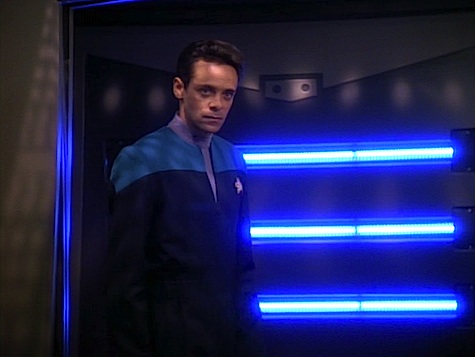
But the plot falls down mostly because Philip Anglim continues to not quite make it as Bareil. He’s either creepy or wooden—the only exception was his over-the-top turn in “Fascination,” which was mostly ridiculous. Indeed, his low-key performance makes the scene of his with positronic implants fail a bit, because robotic Bareil just isn’t different enough from ordinary Bareil to make the tragedy of that scene work as well as the script wants it to.
In fact, the episode doesn’t really shine until the final scene. The slow pull-back as Kira tells Bareil how she fell in love with him and what he’s meant to her is magnificent, ending the episode on a tragic high note, staying on her final time with him without even cutting to an external shot of the station for the executive producer credit.
An ambitious episode that has its tragedy undercut by poor acting and a bad choice in B plot.
Warp factor rating: 5
Keith R.A. DeCandido has autographed copies of many of the books and comics he’s written for sale. They make dandy holiday gifts. Information, including several new books dug up in the garage recently, can be found here.










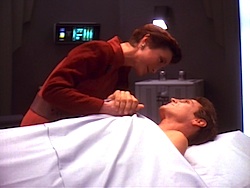
If I remember correctly, the concession Turrel was trying to get was that anything of Cardassian origin on Bajor would be returned to Cardassia. Winn and Sisko seemed confused as to why they would want that, but even to me, a first time watcher, it seemed like an obvious ploy to take back DS9, which technically isn’t on Bajor, but this concession would have set a precedent, no?
The Bariel plot seemed to me as taking from the Theseus’ Ship paradox: How much of something can you replace before it is no longer that original something? Or to put it in simpler terms, the Grandfather’s Axe paradox: “This is my grandfather’s axe. My father has replaced the head, and I have replaced the haft, but this is my grandfather’s axe.”
The Jake and Nog subplot, in any other episode, might have worked better, but taken on it’s own, it’s not bad. I think it’s interesting that they didn’t outright state that Nog’s behavior was wrong, even though to all of us watching it’s obviously deplorable, and the “let’s agree to disagree” outcome was really the only obvious solution, though I would have at least liked some reinforcement to Nog that non-Ferengi women do not like to be treated like Ferengi women. (And as his Uncle Quark can attest, from “Rules of Acquisition”, not all Ferengi women like being treated like Ferengi women. Again, I’m a first time watcher, but I can’t help but wonder if anyone’s thought of doing a Ferengi Feminist Revolution story?)
@1: Since you’re a first-time watcher, I won’t spoil it, but just keep following the series and you’ll see Ferengi feminism addressed.
I don’t think this was a Ship of Theseus issue per se, because only one of the medical procedures involved replacement, and the replacement was not equivalent to the original it replaced. Rather, it was an exploration how far “heroic measures” to preserve life could be taken and when the point came that the quality of life to be preserved was so diminished by the medical treatment that it became a matter of diminishing returns. This is no abstract philosophical conundrum, but something that people have to deal with every day when it comes to elderly or terminally ill loved ones. When do you decide to let go and stop fighting death?
That said, I never felt this episode worked that well. It was noteworthy for advancing the arc through the Cardassian-Bajoran treaty, and for giving Winn some ambiguity in that she seemed to genuinely want the treaty, yet was willing to be ruthless in pursuit of it. But I think I found it a bit contrived with everything continuing to get progressively worse for Bareil — although that may not be unrealistic when dealing with patients so close to death.
The obvious route they should’ve gone here is when Bashir went to put the robot brain in Bareil, they discovered he was already a robot.
This is the most 5 episode that ever 5ed.
There’s just enough here to keep it from being actively bad, but certainly not enough to make it good. The A-plot has some genuinely good moments but is dragged down by the utter bleh that is Bareil. And yes, the B-plot feels wildly out of place.
I had completely forgotten this episode and obviously mixed up Bareil with Shakaar. But, yeah, it almost feels like they relaized there was no chemistry between Kira and Bareil and wrote him out of the show.
They probably were just going for a heroic measures thing, but they stumbled into the intersection of the Ship of Theseus and transhumanism. If you replace your brain with circuity one neuron at a time, when do you stop being you? Pity they couldn’t do more with it.
The B-plot, which is entirely too light-hearted for this episode, was probably supposed to connect to the A-plot through the idea of diplomacy and negotiation of differences. Unfortunately, that was only a MacGuffin in the A-plot.
I must have seen this episode because I remember the Jake-Nog double date thing, but I have no memory of the A-plot at all. I was wondering in his last appearance what happened to Bareil, and I just couldn’t remember.
My biggest issue with this episode boils down to the very foundation itself — the idea that the negotiations would fall through if they weren’t completed right now, immediately, without delay. If the Cardassians failed to show any sympathy to Kai Winn’s “My most trusted aide has been badly injured, he needs time to recover and I want to see to his health personally before we continue”, it would be a major diplomatic faux pas on their part, one that if anything would strengthen the Bajoran position of Cardassians being ‘cold oppressors’.
I feel like Bareil literally killed himself for no good reason.
@7
Actually, I can accept the urgency of the negotiations. It’s not all that uncommon in reality either, usually due to the internal politics of one side or the other. Here, you could say that the major embarrasment of the Obsidian Order a few weeks ago has given the civilian government a window of opportunity. Delay too long and either the OO will recover or the military will gain enough influence to block a peace accord.
I remember suspecting Winn of doing (or commissioning) the sabotage, under the arrogant belief that she could handle the negotiations as well. Apparently not–this time, though she did try to assassinate him before. Winn is probably the most ruthless non-Cardassian on the show.
In fact, one of my grumbles about this show is that nothing sufficiently terrible ever does happen to Winn. (No, folks who remember what finally happened to her, not nearly bad enough.)
The Jake-Nog subplot is indeed horrendously misplaced. The best thing I can say about it is that we can presume that Nog’s experience here, realising that Ferengi ways do not necessarily work anywhere else but on Ferenginar, is at least partly what led to him thinking about joining Starfleet.
I just remeber watching this episode and thinking Philip Anglim should never play a priest in any form ever again. He always dies when he plays one. Nog and Jakes date is wildly out of place for the a plot and I never want to date a Ferengi ever but the females not wearing clothes should have been the first clue to their suckiness.
I didn’t actually mind the A/B-plot combination here, but I agree that the A plot failed to quite live up to the ambitious storyline it was aiming for.
I did think the Sisko/Jake scene stole the show (as it often does) with Sisko’s admission that he had been mistaken about Nog. A great moment of character development, a great father moment of Sisko being willing to be wrong in order to tell his son he was proud of him for living up to Federation ideals of open-mindedness. And a hint about the wonderful changes that Nog and his family will be making to Ferengi society over the next few years, due partly to this friendship.
@2 – Oh man, I am totally excited to see Ferengi feminism addressed. I’ll just say that were I Jake, I’d probably have a hard time keeping my mouth shut too. Even though I understand the values they are trying to preach here (accepting other cultures, etc)…it’s hard when it really does seem so objectively wrong and harmful to a certain class of citizens. But I suppose nobody is going to change because some other culture is shouting at you that you’re wrong and disgusting. It’s through understanding and friendship and widening perspectives that these kinds of changes (gradually) are going to happen.
As for the A plot, I feel so heartless and horrible, but I was actually a bit dissapointed when Bareil revived…and then relieved when I realize he really was going to die for real! Both my husband and I joked that ‘robot Bareil’ really was no different than normal Bareil! I just find his character so awkward to watch. Not that I wanted him to die personally or for Kira to go through all that as a character.
Although, this is probably his best episode, I can appreciate the willingness to see a job done, to give your life in the service of something bigger than you, and I don’t think I’d want to be in stasis either. The thought of it actually kind of creeps me out. And I wouldn’t really want full positronic brain implants either, because I agree that either way, I’d be dead. And I’d rather just die as a man (woman, in my case). I also kind of thought of the Grandfather’s Axe analogy a bit (although, really, none of us have the same cells we were born with, probably! Maybe in our brains? I don’t know how much they regenerate) but I agree it is more a quality of life/humanism type thing. Interesting, though.
I was actually shocked that the treaty was signed, especially as I have seen a few future episodes and am pretty sure the Cardassians don’t really stay on the good side of the Federation/Bajorans, if my memory serves correctly.
I’d like to think that Kai Winn is on some kind of redeeming arc, especially given Bareil’s comment in Fascination that the office was changing her (definitely agree that she was viewed with a lot more suspicion – rightfully so, I even thought maybe she was behind it in order to sabotage the talks entirely – than another character would be), but based on the comments I’ve seen about her character on this post and others…probably not. But I liked her (in so far as you can like her) in this episode. Drawing from my own tradition, there are stories of Popes who do change after being elected Pope, so that could be a neat place to take her character…but of course there are also Popes who do NOT live up that office.
@13: The old saw that all our cells are replaced every seven years is a myth; I believe that brain, spinal, and heart cells last pretty much throughout our lives, whereas certain other cells like those in the stomach lining are replaced as frequently as every couple of weeks. Still, the individual cells have nutrients coming in and waste going out, so the molecules that make them up probably get mostly replaced — although maybe some parts of the cell get replaced more than others. And there are some things that stay in the body indefinitely, like the trace metals that accumulate in the joints and such. I think a lot of the substance of the bones is there pretty much permanently.
I knew you’d have an answer for me :)
And of course we have our bajillion microbes ;)
I was waiting for this episode, because I knew that Bareil was eventually going to die at some point, I just didn’t know when.
Mediocre episode with glimpses of greatness from Visitor and especially Fadil. I never thought I’d say this, as Bashir was my least favorite character when I first started watching DS9, but he’s simply awesome in this episode, tearing Winn a new one. I especially liked the fact that Winn went on to threaten him after he insulted her, just like she had done with Kira in the past, but Bashir lets her know that he doesn’t give a damn!
Believe it or not, her name was Lisa Turtle
And she voiced the Borg Queen in a 2008 Robot Chicken episode.
19 comments! Looks like no-one gives a flip about Bareil’s death, the effect it would have on Kira, or Jake and Nog’s love life. Robotic, stiff and cold – Anglim was born to play that! Louise Fletcher gets a rare comedic moment here with a soufflé named after her.
I agree with the posters here that Phillip Anglim was not very effective as Vedek Bareil. He is reminiscent of Aaron from “The Masterpiece Society” on TNG. He doesn’t have any charisma and little chemistry on screen with any of the other actors. I think it was a mistake for them to have him romantically involved with Kira.
I think he was trying to portray an ultra-serious, stoic monk in this role but tried way too hard and instead he just came across as robotic, stiff, and shallow. An actor like Mark Harmon from “NCIS” would have been perfect in this role.
However, I did enjoy the B-plot and I think they were trying to draw a parallel on how cultural differences can be bridged even in some of the most difficult circumstances.
I just wanted to post a couple of years too late to say that I thought the B plot was very good, if misplaced. Cultural relativism presents a problem when it involves a culture that is so wildly at odds with another. The way Nog acts in this episode is deplorable, as is the way Ferengi culture deals with women in general. Having said this, there is a difficulty in letting folks within that culture know how wrong it is. I have no problem ignoring relativism and criticizing the way the Fregengi deal with women, just as I have no problem criticizing Muslim culture for the deplorable way gays and women are treated; sometimes we need the courage to take a stand with respect to right or wrong. Not actually calls one of these young women “dumb.” This isn’t a only a cultural issue, it’s a rudeness issue.
Jake does a good job of letting Nog know that the folks involved in the double date find his behavior rude and he needs to respect that in the future, he does so (when they make up) in such a way as to not knock the Ferengi culture. In other words, when in Rome. Having said that, as the series progresses, both Rom and Nog come to realize that Ferengi culture is simply wrong in the way it treats women. It’s nice to see that type of change from a couple of characters that are ultimately very likable.
I am in complete agreement with #78. Stargazer4, I thought Alexander Siddig was phenomenal in this episode. His speech about the spark of life was delivered masterfully, as was his last ditch attempt to get Bareil off the hook in his obligations to Winn. Calling out the spiritual leader of Bajor was a gutsy move for the Bashir character, but he was oh so right about her. He started the series off young and overly naive, but really gained a hard edge and an uncompromising dedication to his work after that first season.
Like everyone else, I think the B plot was misplaced, but taken on its own, it was pretty good. Imo, the part were Nog outright insults his date (“She’s so dumb! She’s perfect!”) was a little too contrived, even for a Ferengi, but the core of that B plot was just pure Star Trek.
Lockdown rewatch. And so the end comes for Verdek Bareil, much grief for Major Kira and much rejoicing for viewers and fans of good (even competent) acting, Sorry if I’m harsh on Philip Anglim but he was wildly miscast and came across as wooden and a bit gormless throughout his stint on the show. I don’t know if the show runners always intended to kill him off at this point or if “Fascination” was his last shot to bring anything to the role and he missed the goal by about 10 feet. Of the good stuff in this episode Sididg Puts in another excellent performance in the development of Doctor Bashir, the confrontation scene with Winn is amongst the best scenes in the season, Louise Fletcher puts on her normal acceptable, if one dimensional, role as Winn. Nana Visitor and Avery Brookes are as always very good. As for the B plot I don’t mind it as much as some seem to but it’s possibly in the wrong episode. 5 out of 10 is about correct.
Well it could have been even worse and not even ended on that powerful deathbed scene. Originally, Michael Piller, whose focus was on his new baby at the time: Voyager, refused to have Bareil die and Ira Steven Behr had to convince him that the character of Bareil had gone as far as the writers could take him, and so Piller gave in and let the writers have their way.
WhiIe I appreciate the premise of the A plot, it falls apart in the execution. The actual assistance they show Vedek Bareil giving to win is basic information about past negotiations – information that anyone involved in those negotiations would have. Information that any half-competent negotiator would have documented and put into the records.
So in the end, it appears that either the doctor is right and she is willing to let him die to have someone to blame if the negotiations fail. Or she let him die because she failed to do basic research or ask literally anyone else who was involved in past treaty negotiations.
I don’t think this was the intent. If they intended his help to be so insubstantial, the other characters would have noticed and pointed it out (especially with the stakes so high). They just did a bad job writing Bareil giving actual good assistance in a way she couldn’t get otherwise, perhaps not thinking through that aspect.
@26/LawGeek: Maybe what matters is not just that Bareil remembers the facts of the past negotiations, but that he has the judgment to know which past precedents, out of the many possibilities, are the right ones to apply in this case.